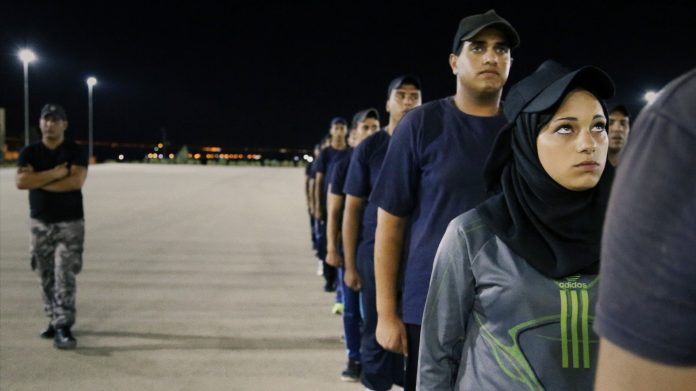(THIS ARTICLE IS MACHINE TRANSLATED by Google from Norwegian)
A cheerful and unruly horse girl grows up without a mother and father, and she wants to fight criminals. A well-known and beloved character, but this time her home is as far from Villa Villekulla as it can get: We find our Palestinian version of Pippi in the Balata camp – one of three refugee camps in Nablus in the West Bank. The camp was established in 1950 to house the Palestinians who were expelled from the areas annexed by Israel when they declared themselves a state in 1948. The Balata camp covers 0,25 square kilometers and today has around 30 inhabitants.
Balatas Pippi
The film is a growing up story about an explosive powder barrel. “I was a troublemaker at school. I hit the teachers and cut up their car decks, ”Walaa says in the film. The rebel and troublemaker is 15 years old and already determined to become a police officer. Walaa is a strong individualist and does not want to study or marry – she wants to join the Palestinian security forces and get weapons training. Despite a tough childhood, she suffers from strength of character. Her mother, Latifa, has spent eight years in Israeli prison for helping a suicide bomber. How does a herd of siblings influence nationalism and support for terrorist acts with the breast milk? Canadian Christy Garland manages to capture this as a recurring theme in the film, but unfortunately never problems.
Director Garland comes close and unfiltered to his Palestinian protagonist.
By filming a lot himself Garland comes close and unfiltered to his Palestinian protagonist – yet all communication is done through an interpreter. The director visits Walaa ten times and follows her for five to six years. The film offers speed, emotion and talking environmental descriptions. Like the opening sequences from the loaded reunion moment with the mother, as Latifa is one of 1027 Palestinian prisoners exchanged for one Israeli soldier. We see a violent spectacle of cars with flags hanging out of the windows, and hundreds of people waiting for their released family members. The scene puts the fate of the family into a greater relief: What does long-term imprisonment of family members do with a family?

The film uses borrowed television footage, where we get to see thirteen-year-old Walaa and her brother Mohammad, who is eleven, and their heartbreaking longing for their mother. The children express very poetically about their feelings, which the film could well have followed up. On the other hand, it brings in other poetry – the visual: In proud gallop we meet Walaa on a muscular Arabian horse on the edge of the camp. "She's cool," I hear over my shoulder from a teenager who's looking fascinated at Walaa. She smiles at her lovely and irresistible smile, which is so contagious and joyous life-threatening that one hopes it never disappears. But suddenly it is gone. Of course, she had to act impulsively where the brutality of reprisals is worst. The fear of her cracking completely shakes me hard. The documentary takes care of her and several others in her family. It is through the small things they came closer to, like in their excitement that a young man from another Palestinian refugee camp (Khan Younis camp on the Gaza Strip), Mohammad Assaf, wins the Arab edition of Idol. Or their sore memories from visits to the prison, where the mother often has not had a shower in a month and is without access to both soap and toothpaste.
A classic tragedy
The documentary's strength is the moments of recognition: We see Latifa striving to upload photos to Facebook, and that she is trying to keep track of her son while in the store.
Wala's brother, Mohammad, is as vocal in tone as his big sister: "When I grow up, I want to be like my cousin." We are told that the cousin is in prison for throwing stones at Israeli soldiers. The attitude becomes a self-fulfilling prophecy – Mohammad is arrested and subjected to violence by a soldier. Walaa fails to intervene and thus triggers this fatal, dangerous, which has been lying around all the time. This is where the movie resembles a classic tragedy. Everything has been notified, and the heroine apparently proudly fought before she blindsided straight into the disaster. Isn't this exactly the essence of history, expressing the paradox and pain of the many dark fates of Balata? Walaa wandered effortlessly through narrow alleys and committed various mobs with the youth's hybris. As an adult, she does not escape long.
The strength of the documentary is the moments of recognition.
Unfortunately, the film fails to go into depth when Walaa gets through the most. Why is the documentary so heavy-weighted all the trouble she put in during the tough training at the police school? Credibility is slipping. Walla's predictable and provocative behavior should have resulted in eviction or harsher punishment. Is it the camera's presence that makes her stay? The suspicion is also growing that the rapist has manifested himself more in the face of the camera.
Walla's new status as a police officer conflicts with the family's expectations of loyalty. Here the scenes are scarce, and it is sub-narrated. At the same time, the depth and familiarity of the confrontation between mother and daughter are missing at the end of the film. Mother Latifa also has her own significant character journey, and as a catalyst and value model for the others in the family, with her new conviction of nonviolent methods, gives double hope for hope.
The film will be shown March 21 and 24 below Arab movie days.


